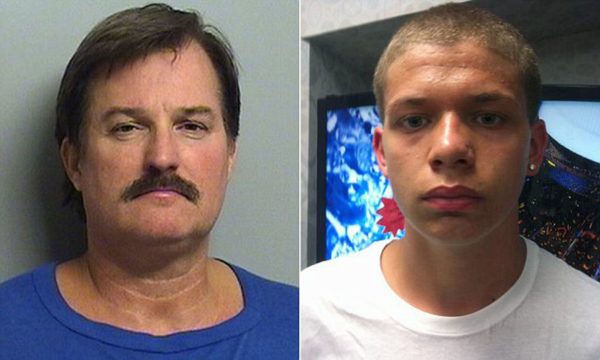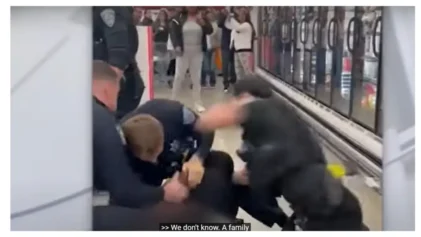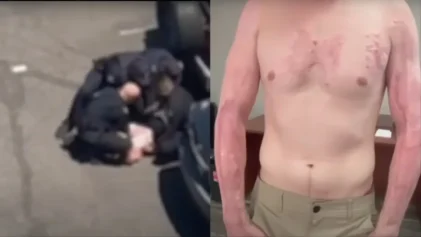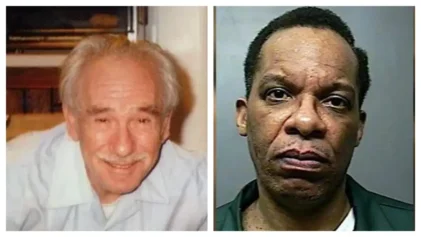A former Tulsa police officer was sentenced to 25 years in prison after being convicted of killing his daughter’s boyfriend in 2014. Despite being convicted of second-degree murder, the ex-cop maintains that he is innocent and acted in self-defense.
The Associated Press reports that on Friday, Jan. 8, an Oklahoma federal judge sentenced Shannon Kepler, 61, to 300 months in prison followed by three years of supervised release.

He was sentenced for using a firearm in the commission of second-degree murder. In April of 2021, a federal jury convicted Kepler in Jeremy Lake’s slaying.
U.S. District Judge Gregory Frizzell further ordered the father to pay restitution to pay for a headstone for Lake, the 19-year old he shot and killed.
The 24-year police veteran said he shot Lake because he felt threatened, believing the teenager had a firearm. He has claimed for eight years his actions were in self-defense. However, police were unable to locate a weapon on Lake’s person or around the scene of the crime. Witnesses also testified that they did not see the young Black man with a gun either.
Kepler would also claim that his daughter had run away from their home on the Muscogee Nation, one of the state’s historic Native American reservations and that he was nervous for her because she was at the time living in a bad neighborhood.
Still, the court of law found him guilty, believing that he should serve time for killing the young man.
In a statement released on the DOJ’s website, U.S. Attorney Clint Johnson stated, “Nineteen-year-old Jeremey Lake died almost immediately after Shannon Kepler gunned him down in the street in 2014.”
“Kepler, at the time, was sworn to uphold the law but instead made a series of decisions that led to the young man’s murder,” he continued. “Today’s 25-year sentence provides a measure of justice to Mr. Lake’s family, though I know their healing continues.”
The statement provided by Johnson’s office detailed the circumstances around the murder, which differ from Kepler’s original assertion.
The courts found that Kepler took his 18-year-old daughter to a homeless shelter a week before the shooting, and left her there after taking away her cellphone and leaving her with no change of clothes or money.
He then logged into her Facebook, where he noticed that she changed her status to “in a relationship” with Lake. He used his access to police databases to research the boy’s criminal records.
He planned, days after tapping into her social media, to confront Lake at the address he secured from the police database. He put on dark clothes and got into his wife’s dark car to go to where Lake was staying, securing a loaded revolver in the waistband of his pants.
He waited for him, however, after seeing his daughter approaching with the young man, he shot twice hitting Lake both times in the chest. He then turned and shot in the direction of his daughter, Lake’s brother, and a third person.
Judge Frizzell dismissed one of the assault charges against Kepler related to this particular incident. The bench noted that the statute of limitations for this crime had expired and thus, he would not be accountable for the violence perpetrated against Lake’s brother.
During the sentencing, Lake’s father was afforded an opportunity to speak about his first-born son, sharing the toll that the process of securing justice has impacted his life emotionally and physically.
According to KJRH 2 News, the first three trials ended in mistrials. In his fourth trial, Kepler was convicted in 2017 in a state trial of manslaughter. The jury recommended 15 years in prison for the crime.
He appealed this ruling on the grounds that since the shooting happened on the Muscogee Nation’s Reservation, and he is a citizen of the tribe, Oklahoma prosecutors lack the authority to try him.
In November of 2020, he was charged with first-degree murder in a federal court and The Oklahoma Court of Criminal Appeals overturned the 2017 manslaughter conviction in March.
Lake’s death was days before that of Michael Brown, the 18-year-old Black boy gunned down on a street in Ferguson, Missouri. Both teenagers were killed by officers, and are said to have contributed to the launch of the Black Lives Matter movement in 2014.
More news from our partners:


